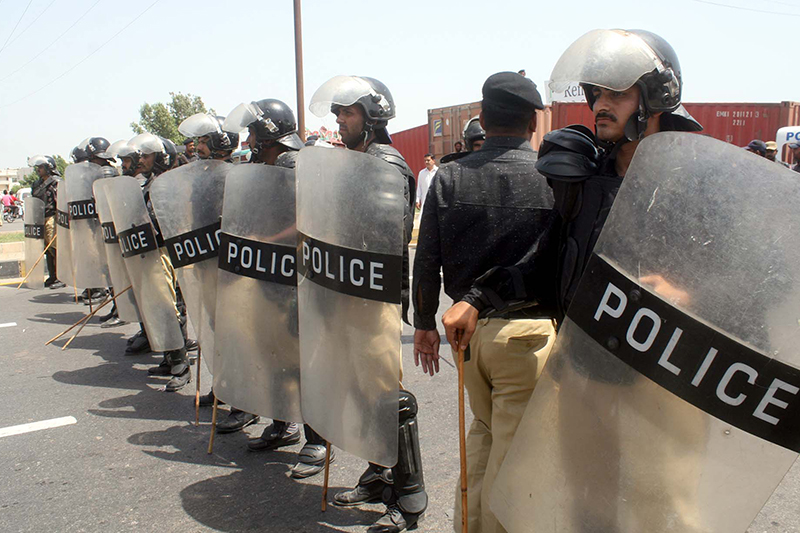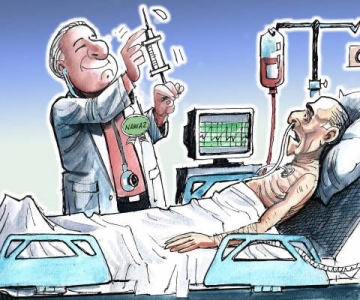My piece published in The Friday Times (June 18 issue)
Leaving aside the political debate on the results of the recent Transparency International (TI) survey, the results are pretty damning for the masters of our destiny. The issue is not about which province is least or most corrupt. The fact that the majority of respondents hold the Police as the most corrupt department since the last eight years is a matter of grave concern. It is even more troubling, given the current security scenario where Pakistanis are facing a crisis of public safety. Markets, shops, and highways are not safe. If there is a respite from the terrorists, then the criminals are there to make hay while collapsing administrative and policing structures struggle to manage their operations. Let us not forget that security of the person and their property is a fundamental right of the Pakistanis.
The party-based and ethnicity-oriented feuds on TI survey are meaningless as the Police is a provincial subject and TI’s surveys have consistently shown that there is something deeply rotten in how the security apparatus works at the subnational level. The causes for such a crisis of governance need to be highlighted, regardless of which party we vote for or where we live. What could be more telling than the events of the recent past?
Lahore has been a target of terrorist attacks for more than a year now. Not a single police officer has been held accountable. The target killings in Karachi, the insecurity in Khyber-Pakhtunkhwa and the sheer lawlessness in Balochistan are mere symptoms of the dwindling law enforcement capability of the state. The common refrain is the lack of resources. But this is only a half-truth.
When resources are made available, they are spent on luxury vehicles and disproportionately benefit the top echelons rather than the thanas that operate without papers to register First Information Reports (FIRs). More often than not the complainants have to bear the cost of investigations. A decade ago, the average cost of investigating a case was Rupees 30,000 and now this must have increased. Imagine the predicament of those who want justice. Pay for it. Otherwise, forget it.
The second most corrupt sector in the TI report is ‘power’. Not surprising, whatever methodology one uses. Power theft remains rampant and collusion of the public servants is all too well known. The energy crisis and long hours of load shedding are in the main caused by the whopping line losses (of over 30%) largely attributable to endemic corruption. WAPDA bills are defective and there are thousands of complaints filed each year in the federal Ombudsman’s office. These citizens have access to the Ombudsman office but thousands lack either the information or resources to get to a complaint redress office.
Power sector is also defined by huge losses, overstaffing and general ineptitude. There is almost no accountability other than the routine suspensions and loud proclamations by the ministers in charge. In a similar fashion, the land administration systems also reek of malfeasance and institutionalised corruption. The sanctity of land records has been violated beyond repair and paying a bribe to get a copy of your entitlement is the norm. Little wonder that TI survey only reminds us of the alarming realities of Pakistan.
But the solution to these culturally embedded practices is neither judicial activism nor politically motivated anti-corruption drives. The international focus on anti-corruption agencies is also misplaced – the experience of National Accountability Bureau in Pakistan and the Anti Corruption Agency of Bangladesh are two examples of how not to tackle corruption. They failed once the political motives of the juntas were exposed.
All provinces have Anticorruption Establishments (ACE). But the way these operate is almost a joke. Generally, they take no action against corrupt officials and if they do, their proceedings are stalled through political pressure or bribes. A senior officer of K-P province joked how the most corrupt get posted to the ACEs. The provinces will have to strengthen these agencies. First of all these have to be autonomous and well staffed with trained investigators and prosecutors. Secondly, they must share their performance in the public domain each year. After the 18th Amendment, this task is even more urgent. With increased powers and functions, the provincial governments have to devise new ways of making their governance accountable and open to public scrutiny.
Another essential reform relates to freedom of information. Now access to public information is a fundamental right. All provinces will have to legislate and open their decisions to public oversight. In the age of Internet, even the placement of tender awards on the websites will have a strong impact on the public sector’s accountability.
Finally, the accountability of the local state is vital to address the public grievances and create a culture of transparency. At this juncture, the local government system under yet another design phase should articulate accessible, open and accountable governance structures. Last but not the least, it is electoral accountability that will determine the future shape of our public culture and reduce corruption. Without regular elections and the supremacy of people’s will, we will remain a corrupt society.
Raza Rumi is a writer and policy expert based in Lahore. He blogs at http://razarumi.com



